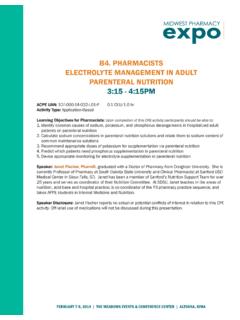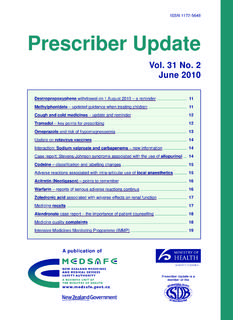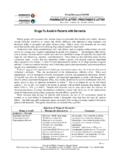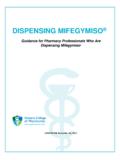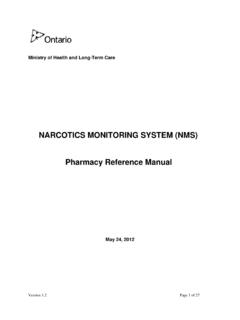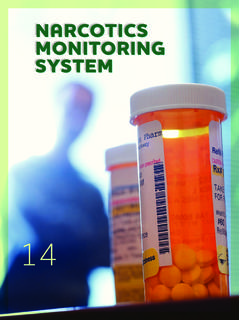Transcription of The Joint Commission Update - gotocei.org
1 The Joint Commission Update ACPE UAN 0107-0000-10-002-L04-P & 0107-0000-10-002-L04-T Hrs. Activity Type: Knowledge-Based Program Objectives for Pharmacists & Technicians: Upon completion of this program, participants should be able to: 1. List the three most problematic medication management standards in terms of non-compliance by organizations surveyed in 2009, and the most common reason why each was scored non-compliant. 2. Discuss the changes in the medication management standards for 2009 and 2010 resulting from the Standards Improvement Initiative, and CMS deemed status requirements. 3. List the top five most problematic medication-related National Patient Safety Goals requirements 2009, including how the requirements for compliance can be met, and common reasons for non- compliance.
2 4. Discuss the current issues and interpretation of the National Patient Safety Goals for Anticoagulation Management. 5. Describe the revised medication-related requirements for NPSG for 2010. Speaker: Darryl Rich, PharmD, MBA, FASHP, is a surveyor for The Joint Commission in the hospital, home care, and ambulatory accreditation programs. In addition, he works for the Standards Interpretation Group serving as an internal resource for The Joint Commission related to pharmacy and medication management. He previously served as Associate Director for Surveyor Management and Development at The Joint Commission for 11 years. Dr. Rich has been with The Joint Commission since January 1993. Prior to coming to The Joint Commission , Dr. Rich was National Director of Pharmacy Services for Critical Care America, Inc.
3 , a national home infusion company. Previously, he served as Director of Pharmacy Services at Boston University Medical Center and Clinical Assistant Professor of Pharmacy at Northeastern University. Dr. Rich received his Doctor of Pharmacy degree from the University of California at San Francisco and a Master's in Business Administration in Health Care Management from Bryant University in Rhode Island. Speaker Disclosure: Darryl Rich reports he is a speaker's bureau member and receives a salary from The Joint Commission . The speaker has indicated that off-label use of medications will be discussed during this presentation. 2010 Joint Commission Medication Management Update By: Darryl S. Rich, , FASHP. Surveyor, The Joint Commission The Joint Commission Faculty Disclosure Medication Management Darryl Rich reports he is an employee and speaker's bureau Update for 2010 member for The Joint Commission , and has no other actual or potential conflicts of interest associated with this presentation.
4 Darryl S. Rich, , , FASHP Darryl Rich has indicated that specific off-label uses of Surveyor, The Joint Commission medication will not be discussed during this presentation. Learning Objectives Pre-Assessment Questions Upon completion of this program pharmacists (or pharmacy True or False: technicians) will be able to: Pharmacists are required to review all List the three most problematic medication management standards in terms of non-compliance by organizations surveyed medication orders from the Emergency in 2009, and the most common reason why each was scored Department, either prospectively or non-compliant. retrospectively within 48 hours. Discuss the changes in the medication-related standards for Having inconsistent range orders continues to 2009 and 2010.
5 Remain the top medication management List the three most problematic medication-related National standard non-compliance issue in 2009. Patient Safety Goals requirements 2009, including how the requirements for compliance can be met, and common reasons The standard related to pharmacy medication for non-compliance. order review ( ) now requires that Discuss the current issues and interpretation of the National pharmacists verify that the ordered medication Patient Safety Goals for Anticoagulation Management. meets the organization's approved indications Describe the revised medication-related requirements for NPSG for use for the medication. for 2010. Pre-Assessment Questions (con't). The top non-compliance issue related to the Refresher on the MM.
6 New NPSG for anticoagulation management relates to the implementation of an approved Standard Changes for 2009. protocol for the initiation and maintenance of anticoagulation therapy in all patients receiving warfarin, heparin and LMW heparin. Standard Improvement Initiative A new CMS-related requirement is for all Medicare Deemed Status narcotic losses and abuses to be reported to not New Anticoagulation NPSG Implemented. only the director of pharmacy, but also the CEO. of the hospital. Copyright, The Joint Commission . May not be reproduced without permission. 1. 2010 Joint Commission Medication Management Update By: Darryl S. Rich, , FASHP. Surveyor, The Joint Commission SII: Standard Improvement Initiative SII MM Changes for 2009. Renumbering and reorganization of manual EP on minimizing risk in managing hazardous medications (moved from EC).
7 Standards rewritten for clarity Medication storage per More RFI's manufacturer's recommendations or if none, less bullets - more EP's pharmacist instructions. no more supplemental findings. Written policy on specific types Direct vs. Indirect Impact of med orders deemed acceptable 45d vs. 60d; direct impact counts toward decision Medication orders reviewed for No automatic decision rendered Variations from hospital-approved indications for use SII MM Changes for 2009 Medicare Deemed Status Pharmacy prep of sterile meds Implications of the Medicare Dispensing timeframes defined. Improvements for Patients and Providers Written process for self- Act of 2008. administration of medications TJC standards more closely aligned with - Written process for managing Medicare COP.
8 Investigational drugs Interpretation based CMS interpretation Written process for responding CMS input into survey process changes & prescriber notification of ADE, ADR, and New EP's based on language specificity in COP. Medication Errors. New definitions in glossary 2009 CMS Pharmacy Related EP's 2009 CMS Pharmacy Related EP's , EP 15 Medication Storage IV medications are administered in accordance with EP 3: The hospital stores controlled (scheduled). state law and approved medical staff P&P. medications in a locked, secure area . EP 19: The hospital has a pharmacy directed by a High Alert Medications registered pharmacist or a drug storage area EP 5: The hospital reports abuses and losses of supervised in accordance with law and regulation.
9 Controlled substances to the individual responsible for the pharmacy department or service and, as appropriate, to the chief executive. Revised wording for 2010. Copyright, The Joint Commission . May not be reproduced without permission. 2. 2010 Joint Commission Medication Management Update By: Darryl S. Rich, , FASHP. Surveyor, The Joint Commission 2009 CMS Pharmacy Related EP's 2009 CMS Pharmacy Related EP's Medication Preparation Med Error/ADR Reporting EP 5: Medications are prepared and administered EP 6: Medication administration errors, adverse in accordance with the orders of a licensed drug reactions, and medication incompatibilities independent practitioner responsible for the as defined by the hospital are reported to the patient's care and law and regulation.
10 Attending physician or clinical psychologist, immediately when possible, and to the hospital- EP 6: In-house preparation of wide PI program, as appropriate. radiopharmaceuticals is done by, or under the supervision of, an appropriately trained registered Revised wording for 2010. pharmacist or doctor of medicine or osteopathy. 2010 CMS Pharmacy-related EP's 2010 CMS Pharmacy-related EP's Effective January 1, 2010 Effective January 1, 2010. EP 28. A fulltime, part-time, or consulting pharmacist EP 8. When departments of the medical staff do not develops, supervises, and coordinates all the activities exist, the medical staff is responsible for the of the pharmacy department or pharmacy services. development of policies and procedures that minimize medication errors.
